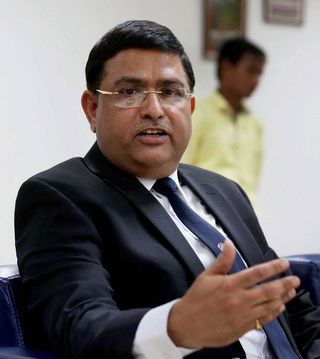On May 17, the CBI office in Kolkata became the arena for a political battle when Chief Minister Mamata Banerjee barged into the office and accused the BJP of political vendetta. Mamata’s target was the CBI headquarters in New Delhi, where interim CBI director Praveen Sinha, a Gujarat cadre IPS officer, had asked his sleuths to arrest Trinamool Congress ministers Firhad Hakim, Subrata Mukherjee and Madan Mitra and former minister Sovan Chatterjee in connection with the Narada sting case.
Sinha’s sleuths got the sanction to prosecute the Trinamool MLAs just days after Mamata was sworn in as chief minister on May 5. As Mamata prepares for a long-drawn fight, the bigger question is whom will the government select as the next CBI director in the coming days.
The CBI director has a fixed two-year tenure and the new director will serve until 2023. The central agency has been without a full-time director since R.K. Shukla, a 1983-batch IPS officer, retired on February 2. Sinha, a 1988-batch officer, was given interim charge. The government has now formulated a shortlist of heavyweight officers from the 1984, 1985 and 1986 batches. At the top of the list are 1984-batch IPS officers Rakesh Asthana, director general of the BSF with additional charge of the Narcotics Control Bureau, and Y.C. Modi, DG of the National Investigation Agency.
Y.C. Modi belongs to the Assam-Meghalaya cadre and has worked in the CBI for more than a decade. He was part of the special investigation team that probed the Gujarat riots cases when Narendra Modi was chief minister. The CM got a clean chit in the matter. The officer is also learnt to be close to the RSS through family connections. Y.C. Modi’s peer group feels that if the government does not want to appoint him CBI director, it will delay the selection process till he retires later this month. Such is his clout.
Asthana is the no-holds-barred type. He took a hit during his open feud with CBI director Alok Verma in 2019. He faced allegations of corruption, but came out victorious after the special CBI court gave him a clean chit in March 2020. “The fact that the selection panel removed Verma, and Asthana was given dual charge of BSF and NCB shows that the government has confidence in him,” said a former CBI director.
Among his major policing assignments, Asthana headed the SIT that probed the Godhra train carnage in 2002. As superintendent of police (CBI) in Patna, his inquiry led to the arrest of RJD chief Lalu Prasad Yadav in the fodder scam. In his second stint in the CBI, Asthana led a team in London for the extradition hearing of fugitive businessman Vijay Mallya.
The big question is, who among them can rebuild the reputation of the CBI, referred to as a “caged parrot” by the Supreme Court due to the corroding political influence on its independence. The three-member selection committee of Prime Minister Modi, Chief Justice of India N.V. Ramana and leader of the single-largest opposition party Adhir Ranjan Chowdhury is slated to meet on May 24. The agency’s chequered past of infighting and corruption saw the committee ousting a CBI director that it had picked.
“The new CBI director should be a man of top integrity, with a long experience of working in CBI and a politically neutral officer who can speak his mind and not just sign files,” said M.L. Sharma, ex-CBI special director.
Some of the 1985-batch officers under consideration for the CBI top job are Loknath Behera, DGP of Kerala, who handled cases like the Mumbai blasts and Babri Masjid demolition; Arun Kumar, chief of the Railway Protection Force, who led the first CBI team that probed the Aarushi murder case; Subodh Jaiswal, DG of Central Industrial Security Force, and former Mumbai police commissioner; and Hitesh Chandra Awasthi, DGP of Uttar Pradesh, who recently handled the Hathras case.
The 1986-batch of IPS officers in the shortlist are also to be watched out for. Leading them is V.S.K. Kaumudi, special secretary (internal security) in the Amit Shah-led Union home ministry. He is known for his probe in the Satyam scam. M.A. Ganapathy, DG of the National Security Guard, has served in the home ministry, handling left-wing extremism and internal security.
Government sources said all candidates have been shortlisted by the department of personnel and training (DoPT), which has administrative control over the CBI. These names were then sent to the Central Vigilance Commission for clearance, after which it reaches the table of the selection committee.
Navneet Rajan Wasan, former CBI special director, said here is where the problem arises. “A half-an-hour meeting with numerical grading of officers, attached annual confidential reports determines the final selection,” he said. “Do you think the CJI or the PM for that matter, knows the officers personally?” Each time the leader of the largest opposition party moves a dissent note, the government still manages to get its favoured candidate in.
Wasan said it would be unrealistic to think that there will be no political pressure on the CBI chief. “Even the FBI director faces tremendous pressure whether it is Donald Trump or any other US president,” he said. “But the FBI director is selected in a comparatively transparent process, where he appears before a Senate committee and is interviewed.” Wasan said a similar procedure can be adopted where an independent body of experts can meet the candidates shortlisted by the DoPT before the list is finalised. “Only by doing this can the bad apples be detected,” said a senior CBI officer. “A poor leader or a bad administrator can sometimes be as dangerous as a corrupt officer.”



